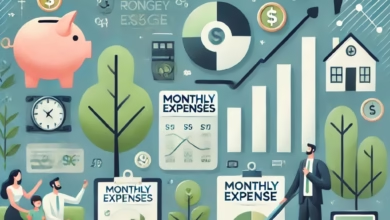
Managing your finances effectively requires proper planning and budgeting, especially when it comes to major life expenses like vacations, home purchases, and retirement. These large financial commitments need careful consideration and strategic saving to ensure you’re financially prepared when the time comes. In this article, we’ll explore practical steps to budget for these significant costs and offer tips to help you reach your financial goals
When planning for major life events like a vacation, buying a home, or retiring, budgeting is key. These big-ticket items require time, discipline, and clear financial strategies to ensure you don’t overextend your budget. Properly managing your money and breaking down these large expenses into manageable chunks allows you to achieve your goals without compromising your financial stability.
1-Why Budgeting for Big Expenses is Essential
Budgeting is essential for financial success because it helps you plan and allocate resources effectively. Big expenses can seem daunting, but when broken down into smaller, more achievable steps, they become far less intimidating. Furthermore, budgeting helps you:
- Avoid debt: By saving in advance, you prevent borrowing and accumulating interest on loans.
- Reduce stress: Knowing you have enough funds to cover your goals helps minimize financial anxiety.
- Achieve financial freedom: A well-planned budget lets you live comfortably while still meeting future goals.
2-How to Budget for a Vacation
Vacations are important for rest and rejuvenation, but they can also be expensive. Here’s how you can budget for an unforgettable getaway without draining your bank account:
Set a Goal
First, determine the type of vacation you want. Are you planning a weekend getaway or a week-long international trip? Knowing the destination and type of trip helps you estimate costs.
Break Down Costs
The main expenses for a vacation typically include travel, accommodation, food, entertainment, and miscellaneous costs. Estimate how much each of these categories will cost, factoring in potential inflation, local prices, and exchange rates if traveling abroad.
Start Saving Early
The earlier you start saving, the easier it will be to cover the costs without financial strain. Set up a separate vacation fund and contribute regularly. You can use tools like automatic transfers or savings apps to stay on track.
Consider Travel Hacks and Discounts
Look for deals and discounts to help reduce vacation costs. Booking flights in advance, using travel reward points, or staying in budget-friendly accommodations like hostels or vacation rentals can save a significant amount of money. Additionally, consider traveling during off-peak seasons for lower prices on flights and hotels.
3-How to Budget for a Home Purchase
Purchasing a home is one of the largest financial commitments many people will make in their lifetime. Here’s how to prepare financially:
Understand the Total Cost of Homeownership
The cost of owning a home goes beyond the purchase price. Consider the closing costs, property taxes, homeowners insurance, and maintenance fees. These ongoing costs can add up quickly and impact your monthly budget.
Save for a Down Payment
Most homebuyers are required to pay a down payment, usually between 3% and 20% of the home’s purchase price. The more you can save for your down payment, the lower your mortgage payments will be. Start by setting a savings goal and contribute regularly to a dedicated account. The more you save upfront, the better your mortgage terms will be.
Manage Your Debt-to-Income Ratio
Lenders use your debt-to-income (DTI) ratio to determine your eligibility for a loan. Aim for a DTI ratio of 36% or lower to improve your chances of getting approved for a mortgage. To manage this, pay down high-interest debts and avoid taking on additional credit before applying for a loan.
Work with a Financial Planner
A financial planner can help you set realistic goals for purchasing a home. They will assess your financial situation and provide personalized recommendations for budgeting, saving, and securing financing.

4-How to Budget for Retirement
Retirement is a long-term goal that requires consistent saving and smart financial planning. Here’s how you can start budgeting for your retirement:
Understand Your Retirement Needs
Determine how much money you’ll need in retirement to maintain your desired lifestyle. Consider factors like housing, healthcare, travel, and daily living expenses. Use retirement calculators to estimate your needs based on current income and expected inflation rates.
Choose the Right Retirement Plan
There are several retirement savings plans to choose from, including 401(k), IRA, and Roth IRA. Each has its own tax advantages and contribution limits. Your employer may offer a 401(k) plan with matching contributions, which can significantly boost your savings.
Automate Your Savings
The easiest way to ensure you’re saving consistently for retirement is to automate contributions. Set up automatic transfers to your retirement account each month to keep your savings on track.
Monitor Your Progress
Track your retirement savings regularly to ensure you’re on track to meet your goals. Make adjustments to your contributions as needed, especially if your income increases or your expenses change.
“Discover How to save money on a low income 2025 with this comprehensive guide from The Savvy Dollar.”
Conclusion
Budgeting for big expenses like vacations, home purchases, and retirement is a crucial part of long-term financial planning. By breaking down these major goals into smaller, manageable steps, you can save effectively and avoid financial stress. Whether it’s through setting specific savings goals, researching costs, or automating your savings, the key is consistency and discipline. Begin today, and with time, you’ll be financially prepared for the major milestones that lie ahead.


